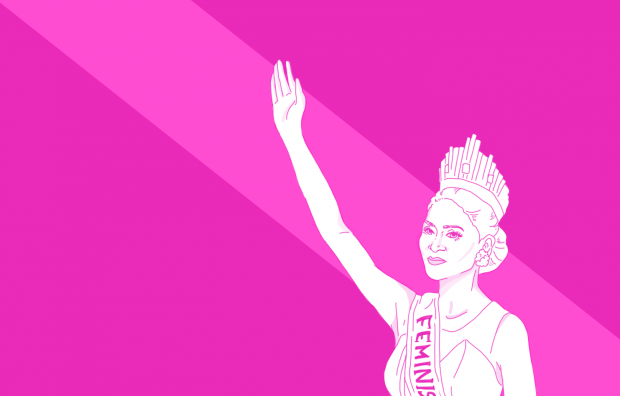We were all about Star Wars and the force awakening this week, until a beauty pageant—long dismissed as irrelevant and inconsequential for being little more than thevisual spectacle of outlandish national costumes, swimsuits, frothy evening gowns and inane answers to pseudo-intelligent questions—hijacked us back from our fantasies of a galaxy far, far away to our present universe where two women were crowned the fairest of them all in a span of four minutes.
Fortunately for us, the real winner was our very own Miss Philippines Pia Wurtzbach, who, it should be said, does seem to break the mold of the traditional beauty queen in that she appears to embody a very confident, very of-the-now kind of beauty that is also very empowering. The woman is smart—and classy—and she used what she had to project all that and more.
But what is the point of beauty contests, really? Forget the fact that, as another friend pointed out, “We have very few sources of national pride these days: boxers, singers, and beauty queens,” hence the collective fury when we fail to bring home the crown, and the corresponding collective frenzy when we do.
But let’s not ignore the obvious: Pageants are a glammed up meat market that unapologetically objectifies and commodifies women, presenting them to the gaze of EVERYBODY, no matter the age or sexual preference. Moreover, forget the fact that most of the time, the standards of beauty hailed at these competitions conform to a mainly western ideal, with the occasional stunner singled out for her “exotic” looks, which reads as darker-skinned or with oriental eyes.
And let’s not pretend that Miss Universe, Miss International, Miss World, Miss Earth and all the many other beauty contests in our ever-expanding multiverse, to quote theoretical physicists, glorify a regressive and ridiculous double standard dictated by the patriarchy: that a woman must be beautiful and pure, because, you know, the absence of purity cancels out beauty.
Ah, that good ol’ “of good moral standing” clause that presumes virginity or at least a certain level of abstinence from sexual activity, which means no secret marriages, no secret children, no secret nude photos and certainly no secret past, yet pronounces a resounding YES to surgically enhanced breasts, noses, and facial contours, not to mention liposuctioned abdomens and laser-brightened smiles. Case in point: Vanessa Williams, the first black Miss America who was stripped of her crown in1983 when nude photos of her surfaced in Penthouse magazine. Sure, they apologized—more than three decades later.
We want them bland and sexless, yet judge them on their sex appeal, and then are horrified when it is revealed that they are sexual beings after all. Heaven forbid that we idolize and fetishize beauties who’ve actually lived fascinating, if colorful lives, taken a lover or two, perhaps, and never given a fuck for what the universe might think of them.
But let’s not also pretend that it’s not a canny marketing platform that benefits, more than the pageant organizers, the contestants themselves. The smarter girls parlay their beauty and their victories, whether on the national or international stage, into a career, or a brand, if you will, with, quite literally, legs and breasts.
And, if their end game is to land a suitable husband or a rich benefactor, a pretty girl with no other passport to propel her above her socio-economic standing could do no worse than join a beauty contest. It’s been the launching pad of many a marriage; a beauty queen title has increased the market value of many young women who have ended up becoming wives, or mistresses, of many prominent men. There’s absolutely nothing wrong with that, even if the trade-off might be bedding the toad with the fortunes of the king. I’m sure a former Miss Slovenia named Melania Knauss, the current Mrs. Trump, doesn’t mind.
There are some who would insist that a beauty contest is nothing more than prostitution, prettied up and glamorized. A friend from Hong Kong who has judged several pageants was telling me how, even as contestants, the various Miss Hong Kong candidates would already have been paired off with assorted businessmen. They’d be set up in their own apartments, given cars and various perks, and in return would be arm candy and more for these men.
When the men would tired of their beauty queen conquests, they would “endorse” them to their other business associates, passing them around from one man to another. Tragic, I know, but hopefully Miss Hong Kong would have invested in a healthy stock portfolio or property when she gets the chance.
From all indications, it would seem that our Miss Universe will escape that sad fate. After all, she did turn down a President.
B. Wiser is the author of Making Love in Spanish, a novel published earlier this year by Anvil Publishing and available in National Book Store and Powerbooks, as well as online.When not assuming her Sasha Fierce alter-ego, she takes on the role of serious journalist and media consultant.
For comments and questions, e-mail [email protected].
Art by Dorothy Guya



